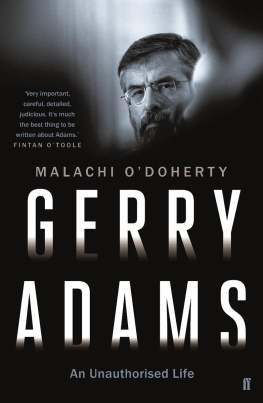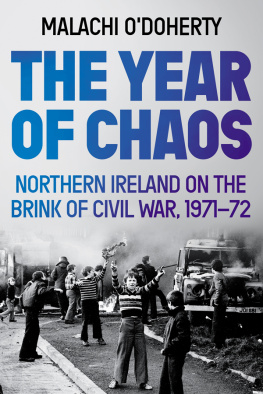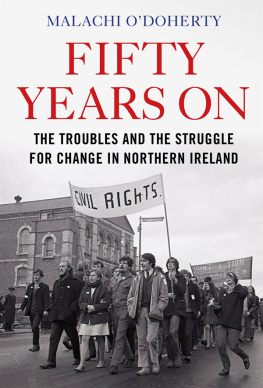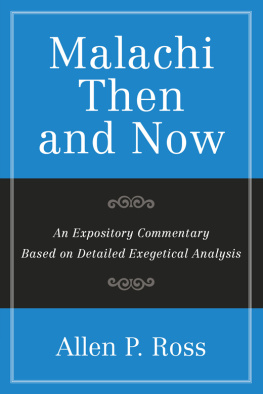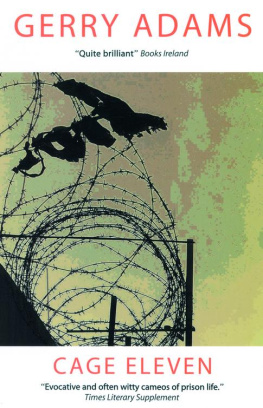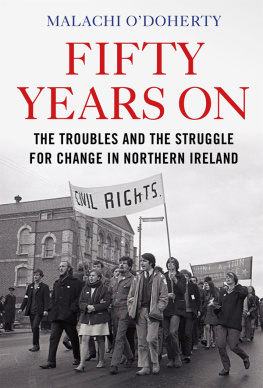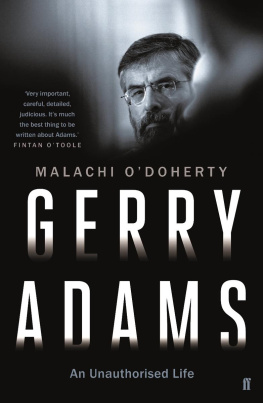Malachi ODoherty - Gerry Adams: An Unauthorised Life
Here you can read online Malachi ODoherty - Gerry Adams: An Unauthorised Life full text of the book (entire story) in english for free. Download pdf and epub, get meaning, cover and reviews about this ebook. year: 2017, publisher: Faber & Faber, genre: History. Description of the work, (preface) as well as reviews are available. Best literature library LitArk.com created for fans of good reading and offers a wide selection of genres:
Romance novel
Science fiction
Adventure
Detective
Science
History
Home and family
Prose
Art
Politics
Computer
Non-fiction
Religion
Business
Children
Humor
Choose a favorite category and find really read worthwhile books. Enjoy immersion in the world of imagination, feel the emotions of the characters or learn something new for yourself, make an fascinating discovery.
- Book:Gerry Adams: An Unauthorised Life
- Author:
- Publisher:Faber & Faber
- Genre:
- Year:2017
- Rating:5 / 5
- Favourites:Add to favourites
- Your mark:
- 100
- 1
- 2
- 3
- 4
- 5
Gerry Adams: An Unauthorised Life: summary, description and annotation
We offer to read an annotation, description, summary or preface (depends on what the author of the book "Gerry Adams: An Unauthorised Life" wrote himself). If you haven't found the necessary information about the book — write in the comments, we will try to find it.
Gerry Adams: An Unauthorised Life — read online for free the complete book (whole text) full work
Below is the text of the book, divided by pages. System saving the place of the last page read, allows you to conveniently read the book "Gerry Adams: An Unauthorised Life" online for free, without having to search again every time where you left off. Put a bookmark, and you can go to the page where you finished reading at any time.
Font size:
Interval:
Bookmark:

For Maureen
All plates Malachi ODoherty.
Since I was little I have seen how you battle with your tears for me, and with a proud glad look, although your heart was breaking.
This is the most tender language used by Gerry Adams in public. It is addressed to his mother, after her death in 1992, contained in a death notice in a daily Belfast newspaper, the Irish News. The words are not his own; they are taken from a poem by Patrick Pearse, the leader of the 1916 Easter Rising, written in Kilmainham Gaol as he awaited his execution. In choosing them, Adams appears to compare himself to Pearse, who believed that his own mother was proud of him as an armed revolutionary and glad that he had had the courage to lead the Irish Volunteers into battle.
Adams has made a slight change to the line. In the original, the phrase since I was little is the concluding part of an earlier line and is followed by a colon. In his version, the battling with tears and the proud glad look date back to his early childhood.
But the parallel between the two men fails on Gerry Adamss own insistence that he was never a member of the IRA. What was it that his mother had to be proud and glad of yet which would also fill her eyes with tears that she would have to battle against?
It was, perhaps, the danger he had put himself in, as a committed republican political activist, pursued by the police who took him for more and by loyalist paramilitaries who, believing him to be what he said he was not, plotted several times to kill him.
The parallel succeeds on one level that Adams would not have wanted to acknowledge back in 1992, before the Irish peace process was properly under way. Both he and Pearse redirected the republican movement against its deeper instincts. Pearse took the Irish Volunteers in Dublin to war against the orders of the national leadership; hence the Easter Rising. Adams coaxed republicans slowly into democratic politics against a fundamental principle that a reformed Northern Ireland was a trap to be avoided.
Adams was the Anti-Pearse.
The Irish News is where all the death notices of the Catholic community appear. The esteem in which clans and their widening circles of in-laws and friends are held can be measured by the number of tributes. Annie Adams got several columns over two days when she died, three days after a stroke at her own front door in Oakman Street on the Falls Road. Many of those tributes were expressions of support for Gerry Adams himself and for his four brothers and five sisters in their grief.
Gerry Adams had been at war for more than twenty years. He had been imprisoned for part of that time, had shaped a political party, Sinn Fin, out of the wider republican movement, and moved from being a committed supporter of revolution to challenging for power through democratic party politics.
Any mother might have worried about such a son, and about her four other sons who had all been active republicans and all spent time in jail. When the Adams family sang rebel songs together they changed the words of the famous Four Green Fields. Instead of the mother in the song singing that she had fine strong sons, in their version she had five strong sons, Gerry, Paddy, Dominic, Sean and Liam.
Gerry was the one the world knew about.
At least three of them, including Gerry, had bullet wounds now.
Dominic, the youngest, wrote in his prison memoir, Faoi Ghlas, that when he was arrested in possession of a pistol while targeting a policeman, his mother visited him in Crumlin Road Gaol to assure him that she and the whole family were behind him and that he had to worry about nothing. My mother had been a
As a child, Dominic had so much taken for granted that he would one day go to jail like his big brothers, that, helping his mother put together a food package for one of them, he had asked her to be sure to send him the same biscuits when his turn came. He was eight years old at the time.
And danger had come to the mother too, her home raided many times by British soldiers.
Her first stroke in the year she died followed a horrific shooting incident at the Sinn Fin offices when a rogue policeman killed three people. Annie Adams had visited the office that very day, to leave parcels for republican prisoners in Long Kesh (the internment camp that later became the Maze Prison). But for timing she might have been the target herself, as any of her children might; she might have seen the bloodied bodies in the reception area and on the stairs.
Her head reeled with the horror. She had had enough of it. Her heart was breaking.
The proud glad look was taken away from her.
Gerry Adams says in one of his books that her first stroke was actually triggered by the stress of what he calls an altercation with police at her home, of which he claims they charged into the house shouting and yelling abuse at her grandson, Patrick Mulvenna. In his account she ordered them from her home, but it was some minutes and further verbal abuse later before they left.
That stroke was not a warning but a precursor. Annie Adams recovered in the following months, regained her speech, but then was felled again in September.
She was barely conscious in the ambulance with her daughter Margaret and her distraught husband, Gerry Adams senior.
Her son Sean was in the ward above her, under guard, a prisoner. Adams says Sean was allowed to visit her, handcuffed to a prison officer. He himself did not visit her and writes that he is sure that she would have understood that his presence would just have endangered her other visitors. She did not recover consciousness anyway.
She died in a routinely murderous week. On the same day, eighteen-year-old Peter McBride was gunned down by soldiers while running from them after they stopped him in Spamount Street. Two Scots Guards would be jailed for his murder and released in 1998.
Two days before Annie Adams was buried, loyalist gunmen murdered Charlie and Tess Fox at their home near the Moy, County Tyrone, for want of being able to get at members of the IRA in their extended family.
Annie was buried in Milltown Cemetery after a bilingual Irish and English mass in a packed Falls Road church, St Pauls. Sean was then given a twenty-four-hour parole to attend. A grandson, on remand in Crumlin Road Gaol on charges that would later be dropped, was released for six hours. These were people for whom the Troubles were family history. This was a tight religious Catholic culture in which, paradoxically, neighbours trusted each other not to steal from them yet one might be respected for having served time in prison, for having killed or tried to kill in the name of Irish freedom.
Annie Hannaway had married Gerry Adams senior just a year after he had come out of jail himself for shooting a policeman in the foot in a hapless ambush. Annie, like her young husband, was from a republican family with a history behind her of generations who had armed themselves, learnt to make bombs and been imprisoned for their cause. Adams senior, at sixteen, was hit by three bullets while trying to flee with a gun that had jammed. He served five years of an eight-year sentence, in the same jail where two of his older brothers were interned at the time. That was during the Second World War and the IRA was trying to win the support of Nazi Germany. They were all held in the grim old Crumlin Road Gaol in north Belfast, behind a wall of grey stone blocks. Another brother was in jail in Dublin.
Font size:
Interval:
Bookmark:
Similar books «Gerry Adams: An Unauthorised Life»
Look at similar books to Gerry Adams: An Unauthorised Life. We have selected literature similar in name and meaning in the hope of providing readers with more options to find new, interesting, not yet read works.
Discussion, reviews of the book Gerry Adams: An Unauthorised Life and just readers' own opinions. Leave your comments, write what you think about the work, its meaning or the main characters. Specify what exactly you liked and what you didn't like, and why you think so.

